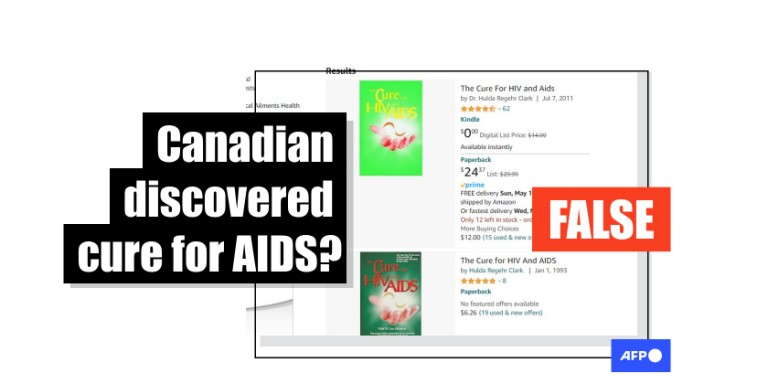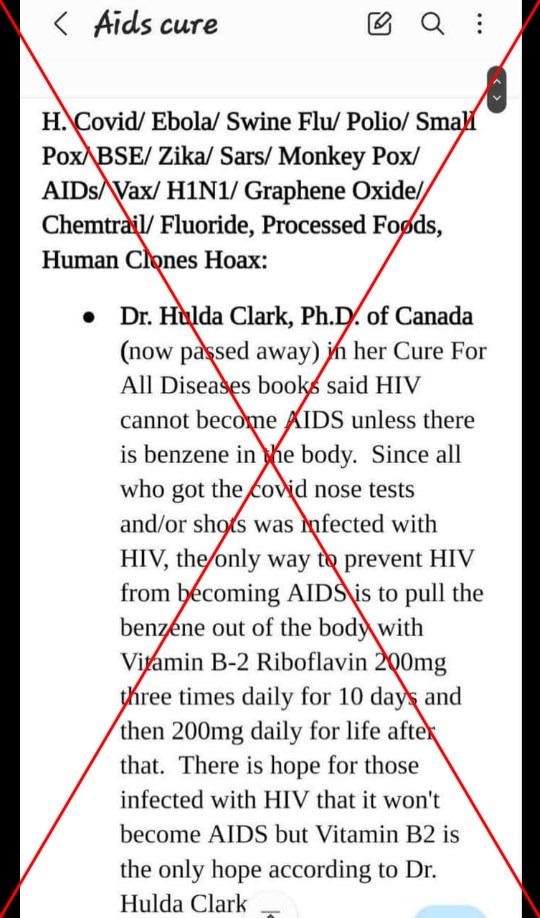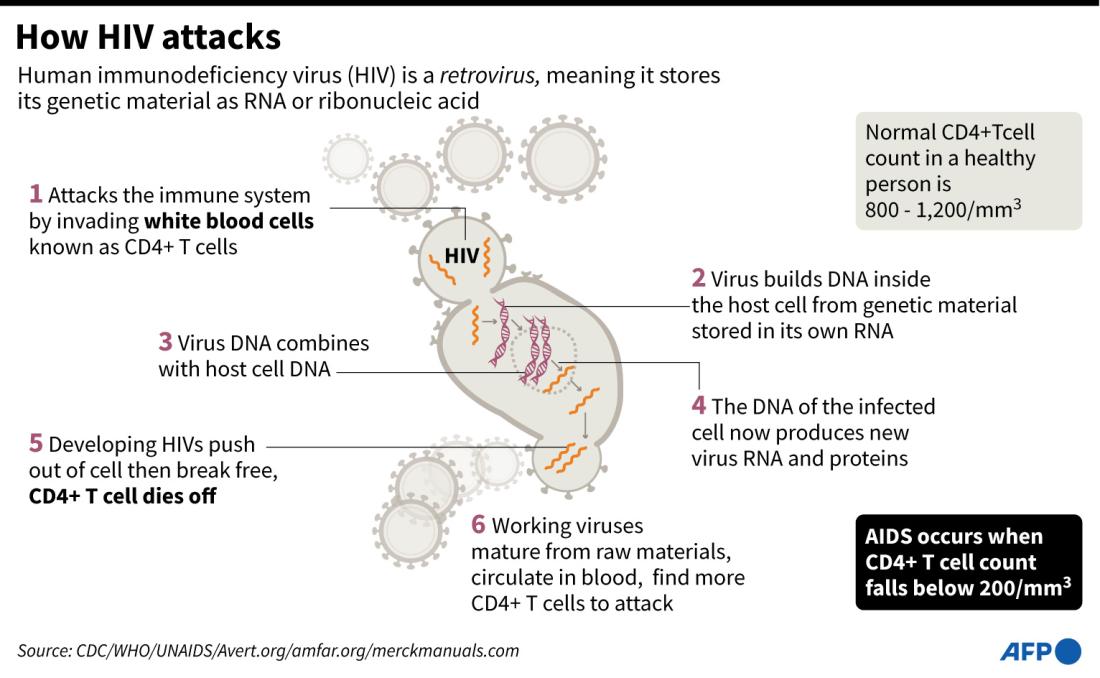
Posts spread false HIV treatment advice
- This article is more than one year old.
- Published on May 20, 2024 at 21:38
- Updated on May 21, 2024 at 23:10
- 4 min read
- By Marisha GOLDHAMER, AFP Canada
"Dr. Hulda Clark, Ph.D. of Canada (now passed away) in her Cure For All Diseases books said HIV cannot become AIDS unless there is benzene in the body," says text in a May 5, 2024 Facebook post.
The post goes on to suggest anyone who received a Covid-19 vaccine was infected with HIV and must take "Vitamin B-2 Riboflavin 200mg three times daily for 10 days and then 200mg daily for life after that."

The same text has circulated for years on Facebook and X alongside other posts touting Clark's books and theories on purported HIV and cancer cures.
According to her website, Clark, who died in 2009, studied biology at the University of Saskatchewan and received a PhD in physiology from the University of Minnesota. She was not an expert in HIV treatment.
In 2001 her "zapper" -- a device she claimed could cure "all diseases" -- was among several products targeted by the US and Canadian officials in an operation to crack down on unproven HIV/AIDS cures, with one company permanently restrained from representing the product as beneficial to health (archived here and here).
Claims that vitamin B-2 can treat the disease are also false, according to Health Canada.
"Riboflavin (vitamin B2) is not a treatment for HIV infection. Antiretroviral therapy is the only proven treatment for HIV and it is highly effective," the agency said in a May 21, 2024 statement.
Sean Hosein, the science and medical editor of CATIE, a Canadian HIV news and information source, agreed.
"For the vast majority of people, HIV, if left untreated, destroys the immune system," he said May 9. "There is no connection to benzene or any other spurious claim, and taking one B vitamin isn't going to make any difference."
Experts have repeatedly told AFP and other fact-checking organizations that the Covid-19 vaccines do not contain HIV and that the shots are not associated with an increase in diagnoses. AFP has also debunked claims that the shots decrease the body's immune response in ways similar to AIDS.
HIV treatment
HIV is transmitted through blood, semen, pre-seminal fluid, rectal or vaginal fluids, and breast milk (archived here). The most common way the virus spreads is through sexual activity, and using condoms significantly reduces the risk (archived here).
HIV attacks the immune system and can be diagnosed via a blood test (archived here). An estimated 62,790 people were living with HIV in Canada at the end of 2020, according to the latest available data (archived here).

HIV is a manageable chronic condition; patients are treated with antiretroviral (ARV) medicines that stop the virus from replicating and turning into AIDS, according to the Joint United Nations Programme on HIV/AIDS (archived here). An injectable formulation called Cabenuva (archived here) is approved for use in Canada, but not all patients are eligible.
If taken as prescribed, ARVs can reduce the amount of HIV in the body to exceptionally low levels, keeping the immune system working and preventing illness. Sometimes the viral load is so low that a test cannot detect it (archived here).
"I encourage everyone who's sexually active or who has been sexually active to get tested, and if they're positive, they talk to their healthcare provider about getting on treatment and staying on treatment," Hosein said.
ARVs given to people without HIV, called pre-exposure prophylaxis (PrEP), can also prevent the disease, according to the World Health Organization (WHO) (archived here).
"When taken as prescribed, the medication reduces the risk of acquiring sexually transmitted HIV by more than 90 percent," Health Canada says on its website (archived here).
Still, thousands of posts across social media tout unproven natural or alternative "cures" for HIV.
Searching for a cure
The WHO says on its website that there is "no cure for HIV infection," but scientists continue to look for one.
CRISPR genome editing has successfully removed viral DNA, opening up potential pathways toward a cure (archived here).
A February 2023 study found one patient was cured of leukemia and HIV after years of treatments that included a stem cell transplant (archived here). Dusseldorf-based Marc Franke is said to be the third "HIV-free" person, following similar successful transplants in Berlin and London (archived here).
Research on a potential connection between B vitamins and HIV/AIDS has proved less conclusive (archived here).
B Vitamins such as vitamin B-2, or riboflavin, are essential for maintaining immune function (archived here).
"In addition to producing energy for the body, riboflavin works as an antioxidant, fighting damaging particles in the body known as free radicals," Mount Sinai, a major hospital system in the United States, says on its website (archived here).
One 2013 study in Botswana offered patients a daily supplement of multivitamins including B-2, B-12, C, E and selenium (archived here). It found a 24-month supplementation given to patients "in the early stages of disease significantly delayed time to HIV disease progression," but had no effect on viral load.
Other studies have shown some HIV patients suffer from vitamin B-12 deficiency and need supplements in addition to antiretroviral medications (archived here). But Hosein said patients must seek nutritional advice from their doctors before starting any new regimens.
"The harm is people aren't going to see a doctor and are not going to get proper treatment because any vitamin or so-called supplement by itself is not going to change your immune system and make you healthier," Hosein said.
"The vast majority of people with HIV on treatment will have a near normal life expectancy."
More of AFP's reporting on health misinformation is available here.
This article was updated to add comment from Health Canada.May 21, 2024 This article was updated to add comment from Health Canada.
Copyright © AFP 2017-2026. Any commercial use of this content requires a subscription. Click here to find out more.
Is there content that you would like AFP to fact-check? Get in touch.
Contact us
